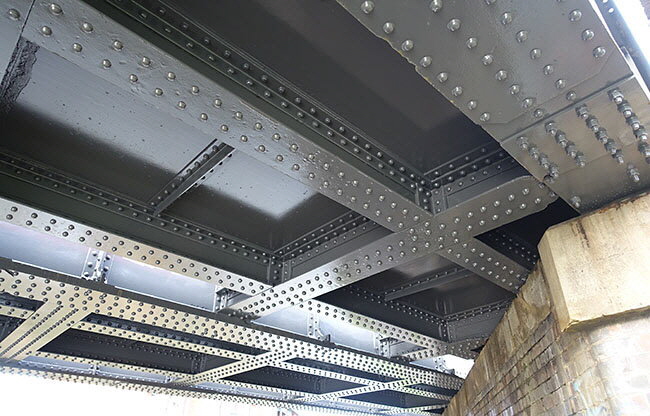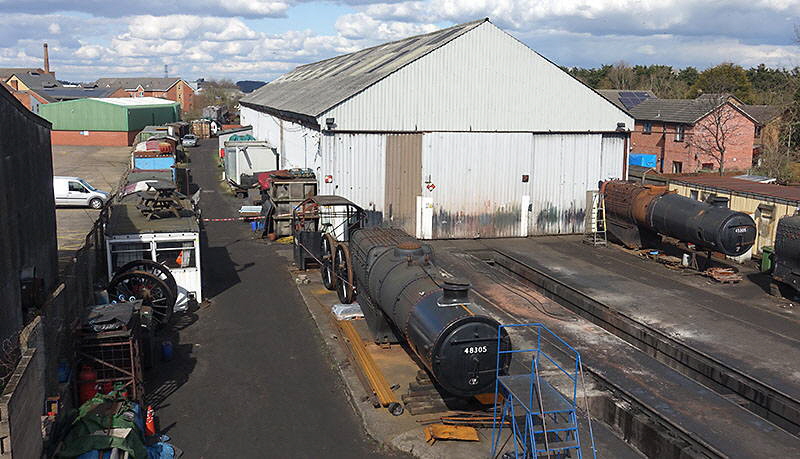[Leicester North]
[Abbey Lane Area]
[North Viaduct]
[Leicester Central]
[Braunstone Gate]
[Goods Yard]
[Aylestone]
[Bridging the Gap]
[Notes for Visitors]
[Old Photographs]
[Archive]
[Links]
This page shows photographs of the of the progress of the preserved Great Central Railway ‘Bridging the Gap’ project in Loughborough - restoring the rail link between the north of the GCR and the south of the GCR(N), that was removed in the 1980s (see the Old Photographs Section).
Click here for a map of this area from Bing
Notes on using the Bing Map
The map linked to is the Ordnance
Survey map.
To see an aerial photograph of the area covered by the map click on the tab labelled “Ordnance Survey” near top right of the screen and select ‘Aerial’ from the drop-down list.
When
finished with the map click on the browser ‘Back’ button till you return here.
This exciting project involves some major civil engineering tasks:
- The construction of a bridge over the Midland Main Line at Loughborough - Now completed.
- Reconditioning the original bridge over the canal - Now completed.
- Bridging Railway Terrace.
- Rebuilding several hundred metres of embankment - Work started.
- Relaying track and installing signalling.
The intention is to update this page as work on the project progresses.
1) Bridge over the Midland Main Line at Loughborough
The first, and the major, civil engineering task of the project was the construction of the bridge over the Midland Main Line, which is now completed save for the final blue facing bricks.
The bridge over the Midland Main Line was completed in August 2018
9/4/17
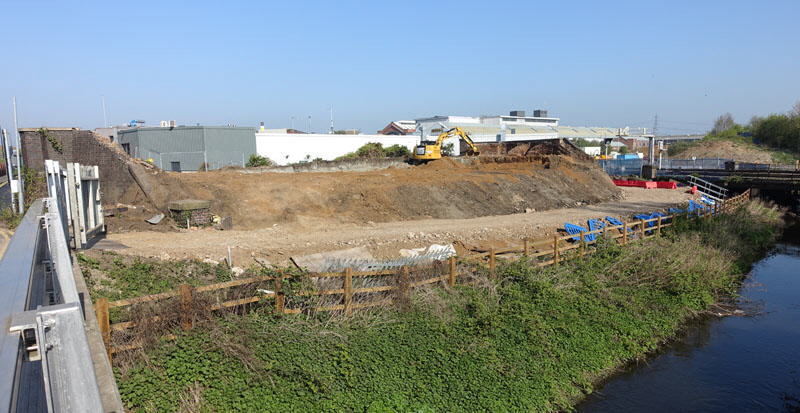
9/4/17. Work has started next to Preci-Spark, on the south side of the Midland Main Line, with the original embankment being reduced in height. On the right is the Hermitage Brook.
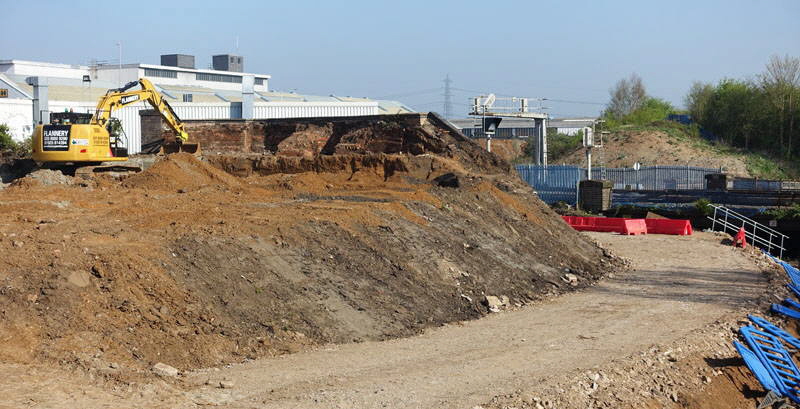
9/4/17. Reducing the embankment has revealed the method of construction of the original GCR bridge abutment. The embankment on the north side can be seen beyond the fence to the right of the signals, 9/4/17.
16/4/17

16/4/17. On the south side of the Midland Mainline the old embankment has been greatly reduced, but still a couple of feet high has been left and is being covered with chippings. Most of the old abutment will be retained. Passing is 66019 with a northbound Network Rail works train.
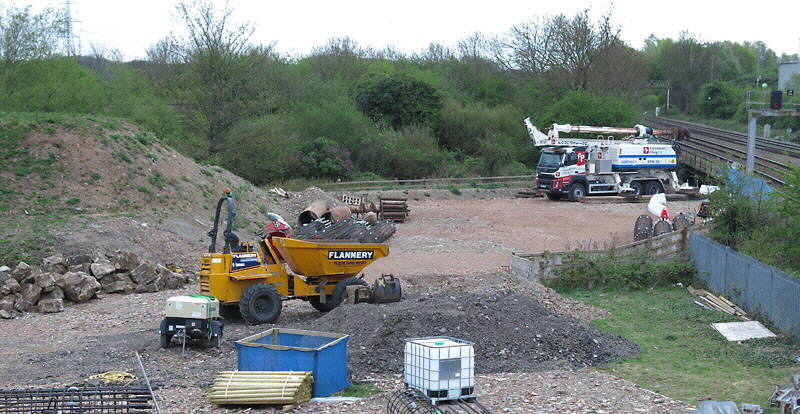
16/4/17. A piling auger has arrived and is positioned on the north side of the Midland Mainline ready to bore the holes for the piling.
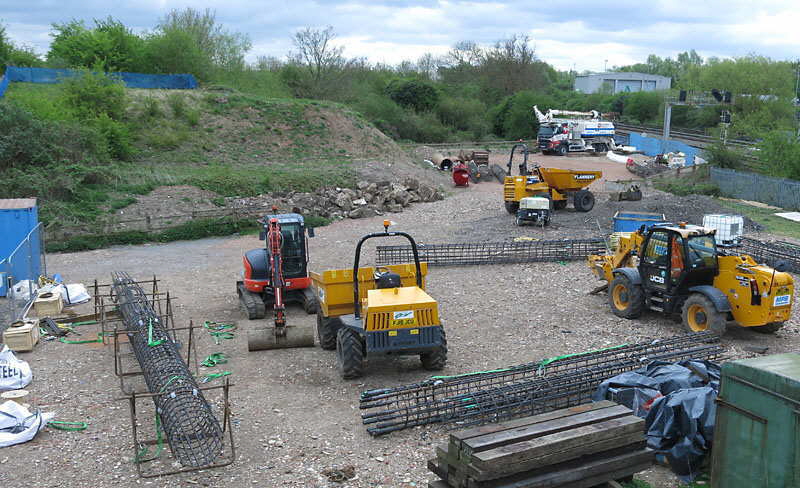
16/4/17. Nearby, steel reinforcing assemblies for the concrete piles are being built up.
28/5/17
The original pile boring machine left soon after the last report on 16/4/17, and there was little change from
then until a new pile boring machine arrived on 26/5/17. This larger machine is required because of the higher than expected water table, though this has increased the cost of the project — see http://www.gcrailway.co.uk/unify/. So work should restart soon.
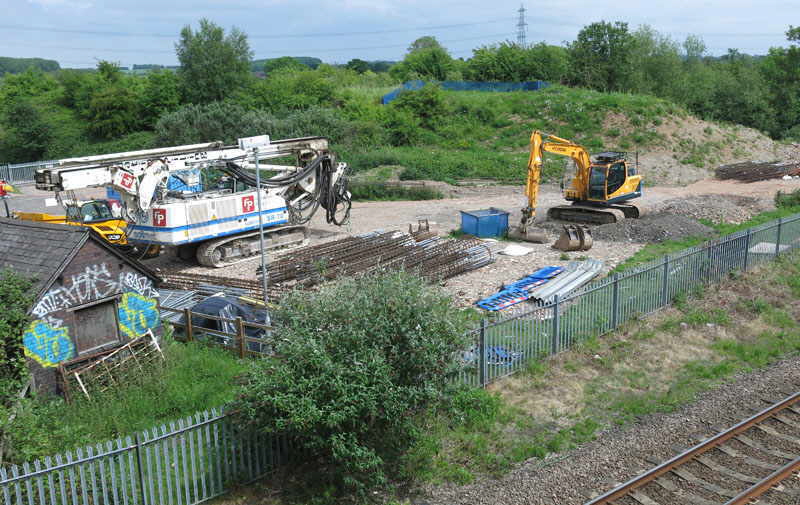
28/5/17. The larger pile boring machine stands on the left inside the work compound on the north side of the Midland Mainline.
9/6/17

9/6/17. The pile boring machine stands back while concrete is poured into a hole that it has bored next to the north side of the Midland Main Line.
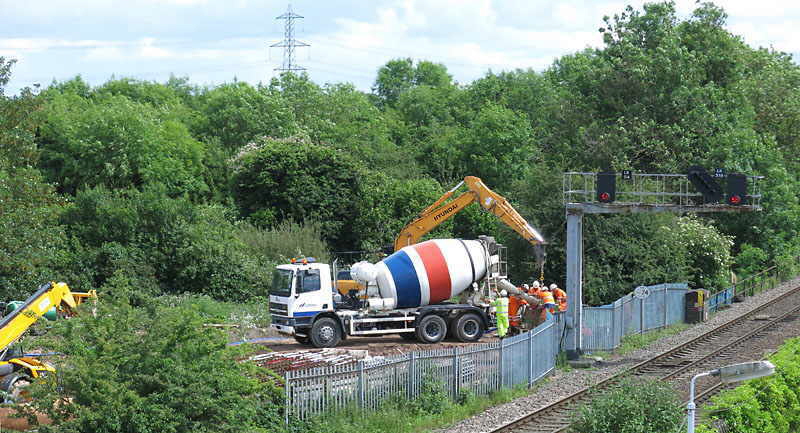
9/6/17. Concrete being poured into a pile hole next to the north side of the Midland Main Line.
23/6/17
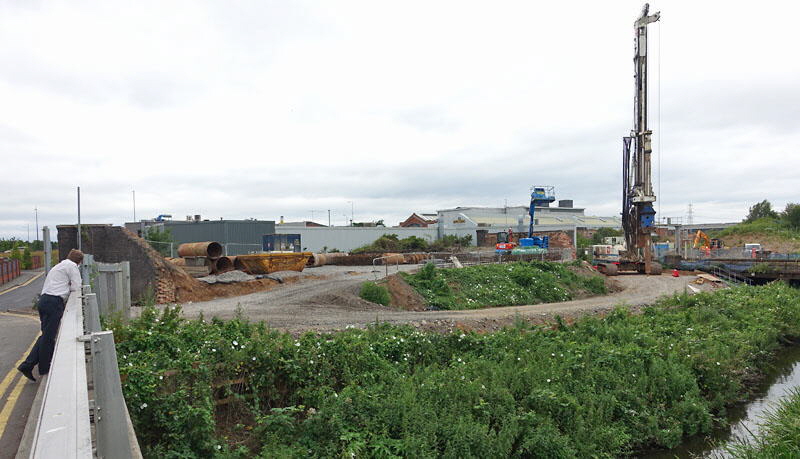
23/6/17. After completing some of the piles on the north side, the pile boring machine was moved overnight to the south side.
6/8/17
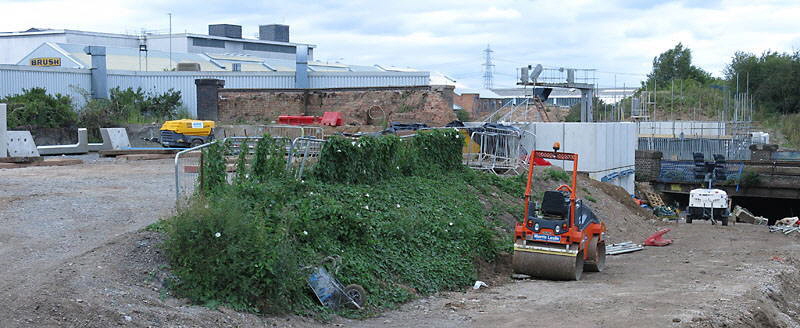
6/8/17. Abutments are being built by forming walls from concrete sections around the piles, inserting reinforcing bars and then filling with ready-mix concrete. On the south side the new abutment is situated between the old GCR brick abutment and the Midland Main Line.

6/8/17. The bridge abutments are progressing where the piles were inserted.
10/8/17
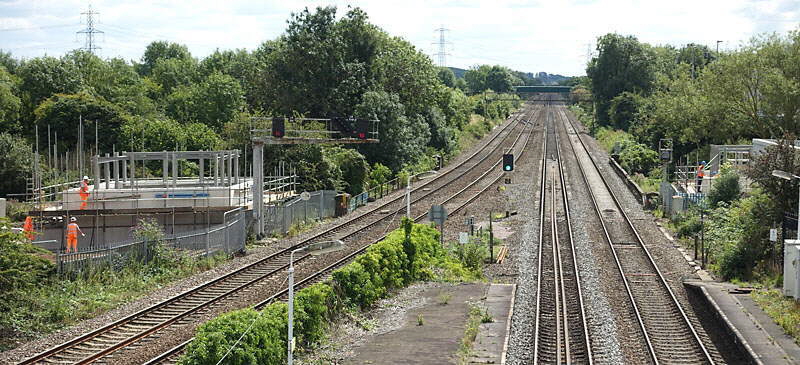
10/8/17. Steel structures are being erected on the concrete foundations of the abutments.
27/8/17
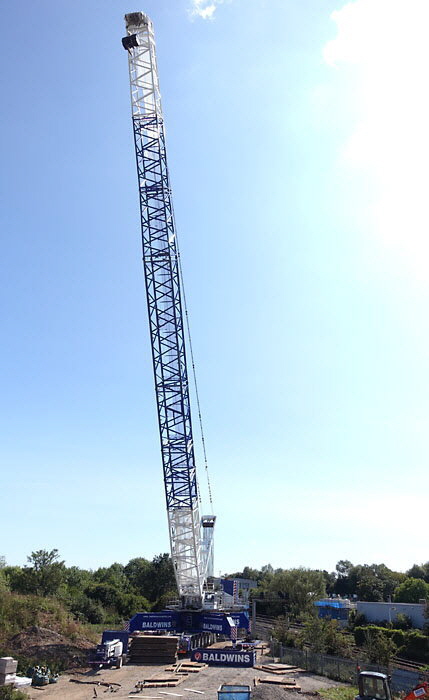
27/8/17. An enormous Liebherr LG 1750 crane has been used to put the abutment cappings in place and will be used to place the bridge into position.
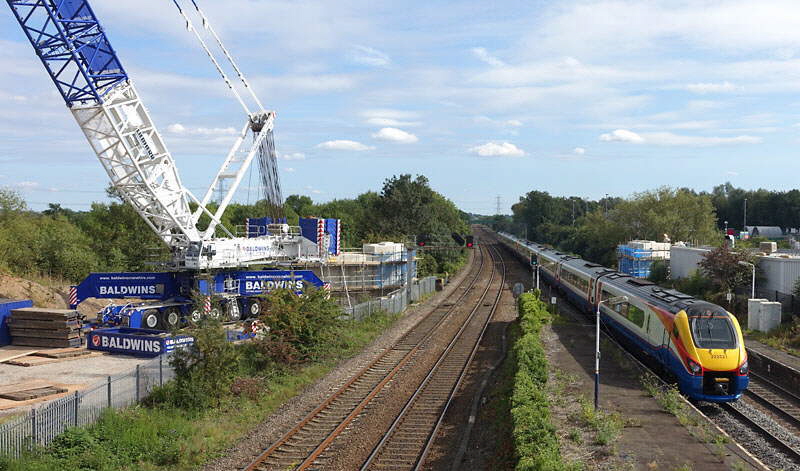
27/8/17. A Meridian on a Nottingham to St. Pancras service passes the gap, which is about ready to take the new bridge, and the Liebherr LG 1750 crane that has been used to put the abutment cappings in place and will be used to place the bridge into position.
3/9/17 The side beams of the new bridge were delivered and installed in the early hours of Sunday 3rd September 2017.
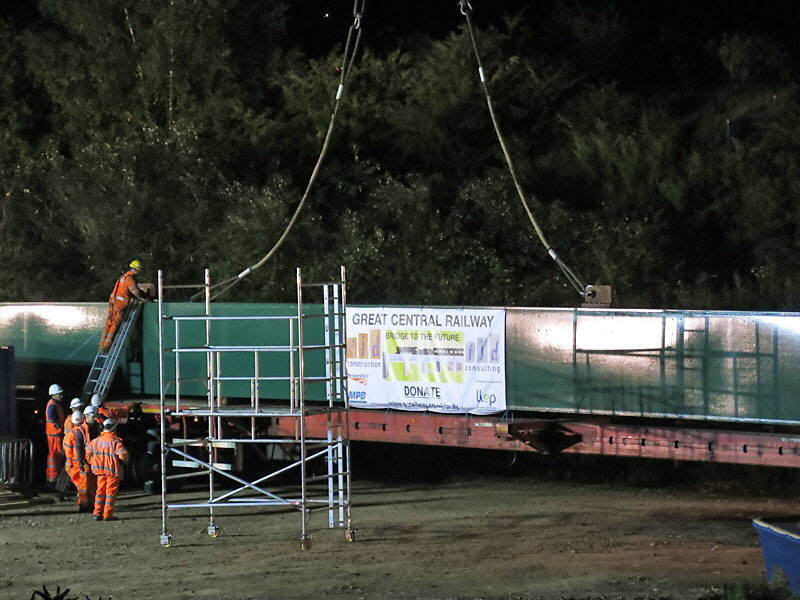
3/9/17, 02:05am. The steel ropes are attached to the first side beam of the bridge after delivery by lorry. A Great Central Railway “Bridge to the Future” banner has also been attached.
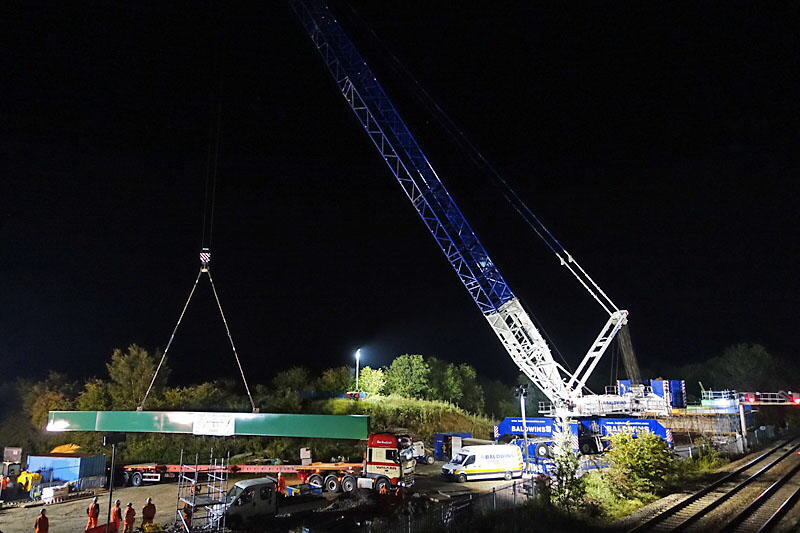
3/9/17, 02:15am. The first side beam of the bridge is slowly lifted off the lorry, with perfect weather for the operation; dry and with little breeze.
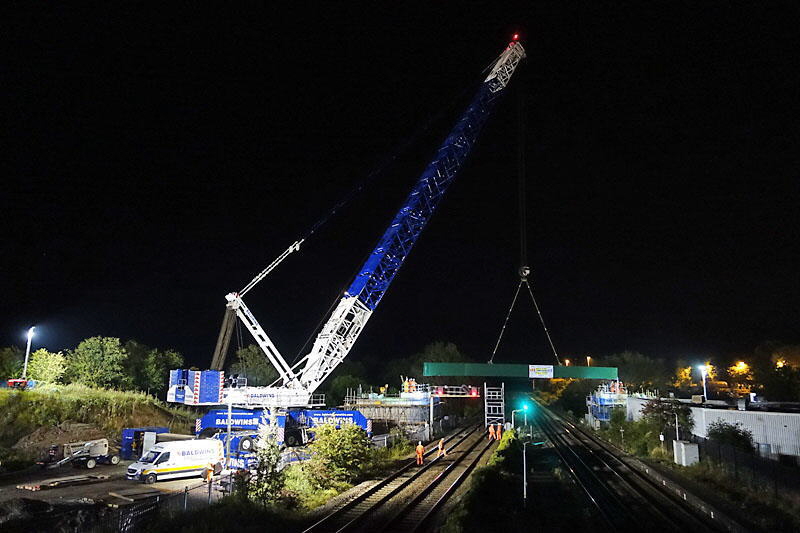
3/9/17. The first side beam of the bridge (the west side) is gently lowered into position on the abutments.
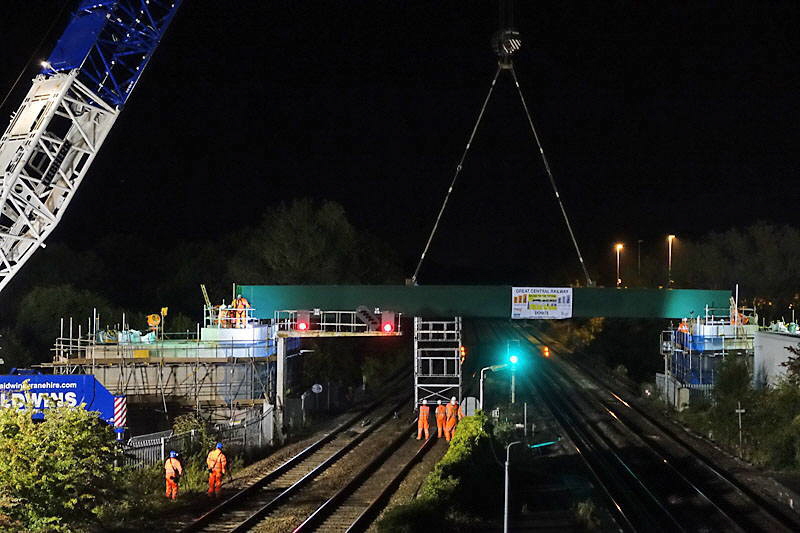
3/9/17. The west side beam of the bridge is fixed to the abutments, about 37 years after the original bridge was removed.
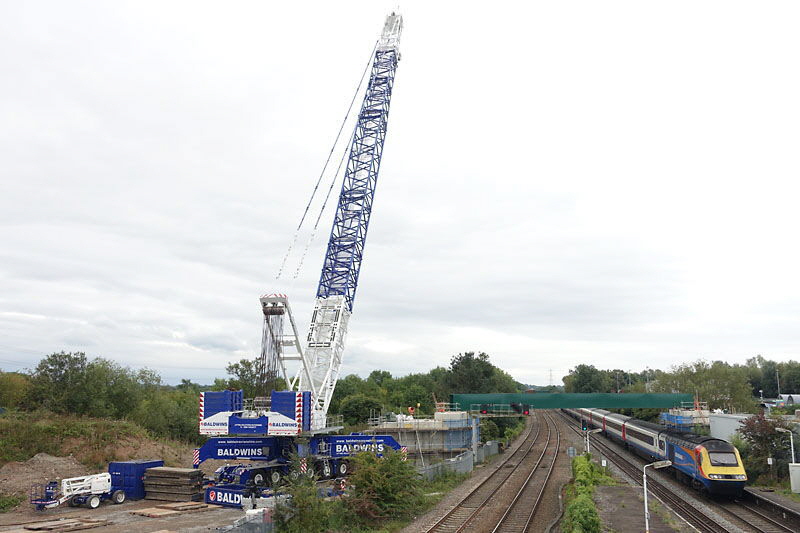
3/9/17. Later that day, an Intercity 125 on the 1F39, 13:55, St Pancras International to Sheffield passes under this new feature over the the Midland Main Line. The banner that was in place during installation has been removed.
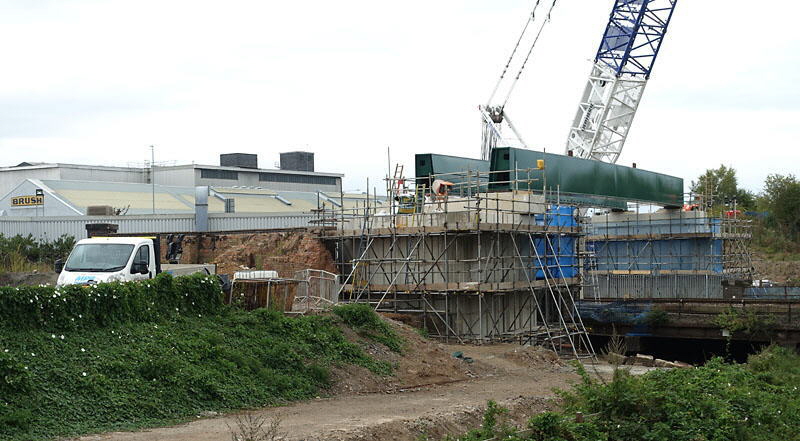
3/9/17. From the south side of the Midland Main Line the box-section construction of the side beams can be easily seen. The deck is to be fitted later.
It
is readily apparent that the new bridge has been slewed slightly to the east of the original embankment here (the end wall of which can be seen to the left behind the white vehicle), to give room around Preci-Spark.
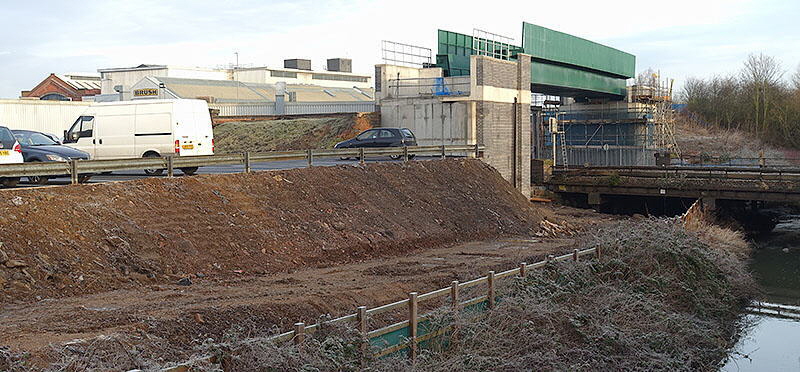
February 2018. On the south side Preci-Spark have had their car park reinstated. It is likely that the edge of the car park will be bridged.
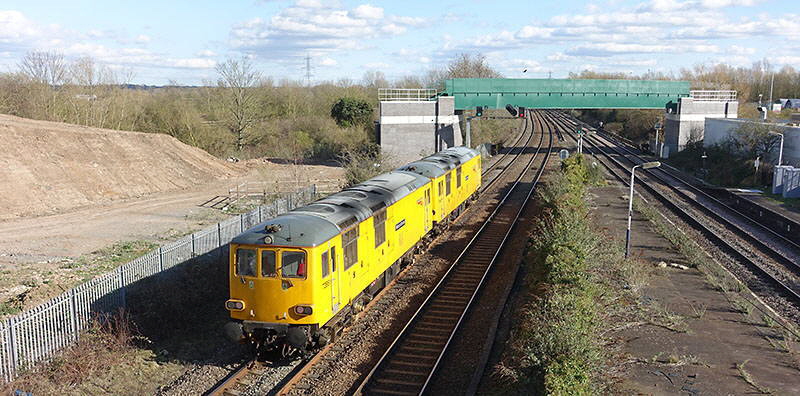
August 2018: The bridge over the Midland Mainline was completed after some remedial work on the decking. Here in March 2019 electro-diesels 73952 & 73951 pass under the new bridge with a working from Derby RTC to Leicester and return.

March 2019: Panoramic view of the bridge from Nottingham Road after the earth removed from the embankment to make room for the bridge to be installed had been replaced in its original position. The embankment is actually out of alignment to the new bridge, which is slightly south of the original bridge in order for the new trackbed to clear the Preci-Spark premises. Planning permission has been granted for the land in the foreground for “standby electricity generation and balancing facility, comprising gas utilisation engines, battery based storage unit, security fencing, gates, substation, transformers, control cabinet, LV switch room, CCTV, welfare and storage containers and ancillary infrastructure”.
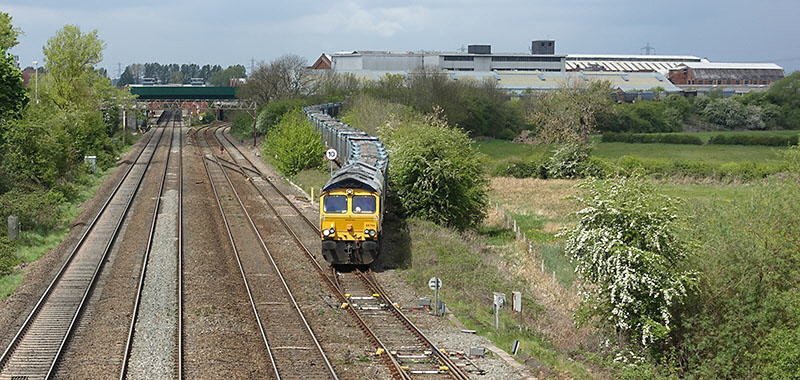
May 2019: View looking north along the Midland Main Line from Alsopp’s Lane bridge with the new, green, GCR railway bridge in the distance and the old brick
Nottingham Road bridge behind it. Coming slowly down the chord from the GCR(N) to the Midland Main Line is Class 66 no. 66744 “Crossrail” with empty gypsum containers from the Gypsum works at Hotchley Hill
returning back to Middlesborough. Unfortunately, in September 2020 the bridge over the A60 Nottingham Road on the line up to East Leake was reported as unsafe for trains due to corrosion and the gypsum trains were
suspended. For further photographs of these trains see the page ‘Gypsum Trains to East Leake’ on this site
The bridge over the A60 has now been replaced and this chord is now operational again, though the gypsum trains have not restarted. When “The Gap” is completely bridged this chord will allow trains from the national network to reach the greater GCR and then travel the full length from Ruddington to Leicester North.
For more information about the erection of the bridge over the Midland Main Line visit the Great Central Railway site at http://www.gcrailway.co.uk/unify/bttf.php.
There are some photographs of the original GCR bridge over the Midland Main Line in the Old Photographs section of this site.
2) Reconditioning the original Canal bridge
The original GCR bridge over the Grand Union Canal in Loughborough was never removed after closure of the line and remains in place approximately 120 years after it was constructed. Detailed examination of the bridge has shown that it is substantially sound though some reconditioning is required due to corrosion after all this time. A target of £475,000 was set to be raised to start on the work which was carried out when traffic on the canal was very light over the winter of 2018/2019.
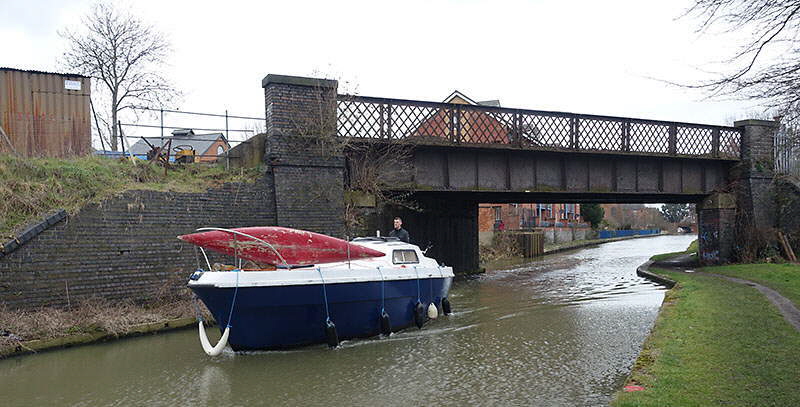
March 2018. The GCR bridge over the Grand Union Canal, looking west.
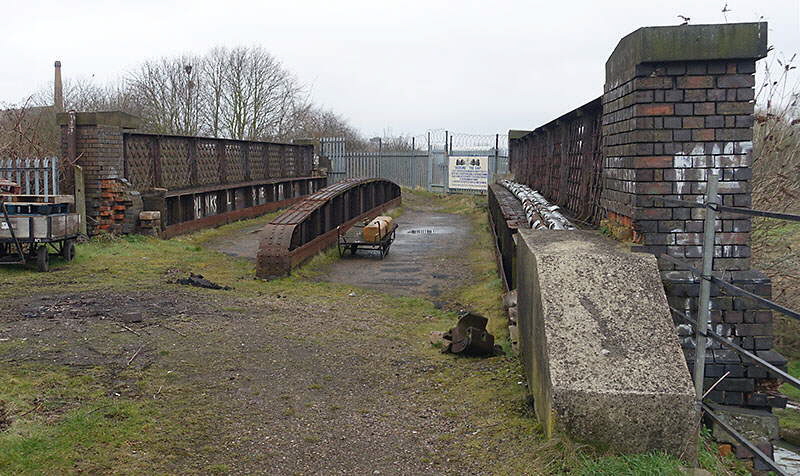
March 2018. The GCR bridge over the Grand Union Canal, looking north towards ‘The Gap’. Laying over the right side of the bridge are corroded tubes which carried fibre optic cables as part of a national network—these have now been disconnected.
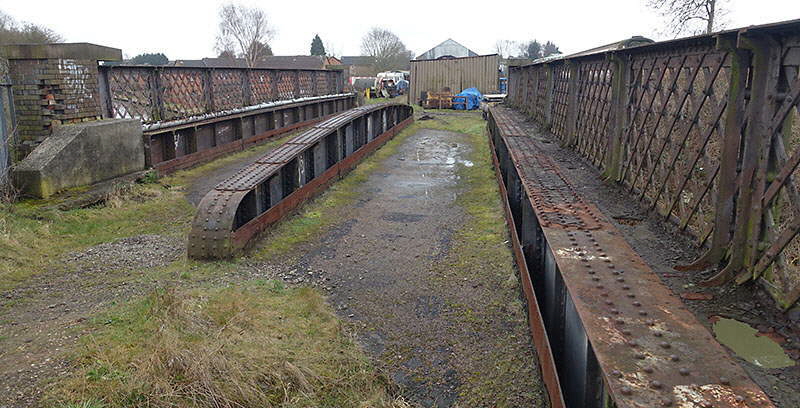
March 2018. The GCR bridge over the Grand Union Canal, looking south towards the locomotive shed (with pointed roof) and Loughborough station. The locomotive shed occupies the original trackbed, and it is proposed (see below) that a new shed is built to the right to provide space for relaying the track.
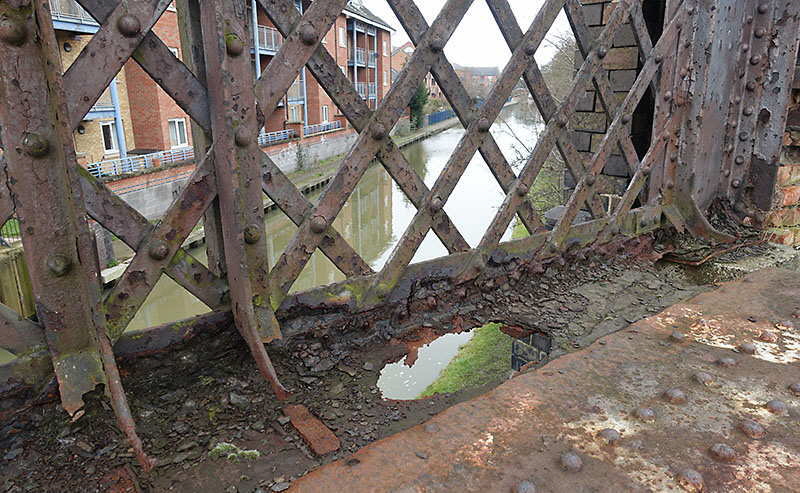
March 2018. The bridge is substantially sound, but has some corrosion which will need to be fixed. The work has been assessed as possible without having to crane the bridge out.
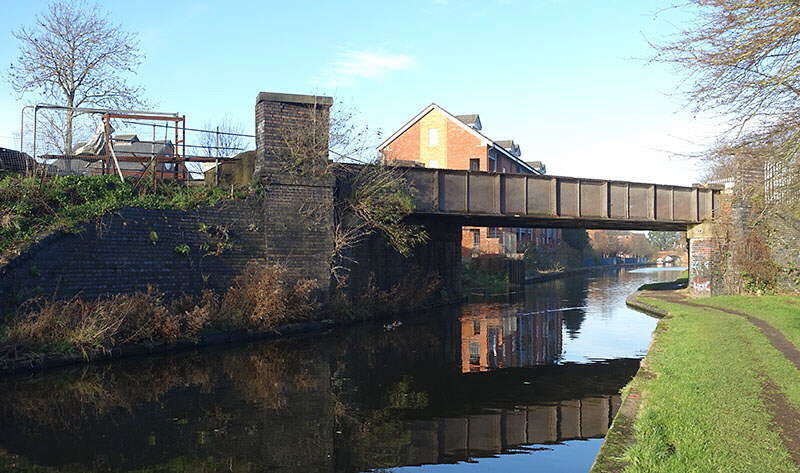
December 2018: The lattice parapets of the bridge over the canal have been removed by crane for transport to a specialist company for refurbishment.
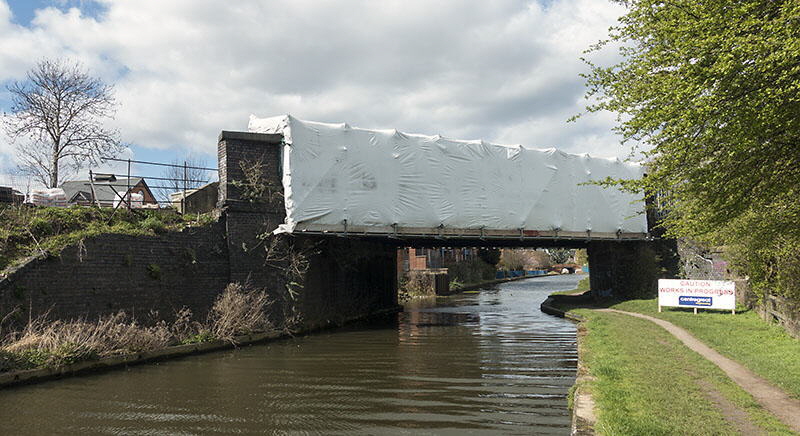
March 2019: The top of the bridge has been encased in a cocoon over scaffolding to allow refurbishing work to continue without contaminating the canal and environment.

May 2019: After partial refurbishment the protective cocoon over the bridge has been removed.
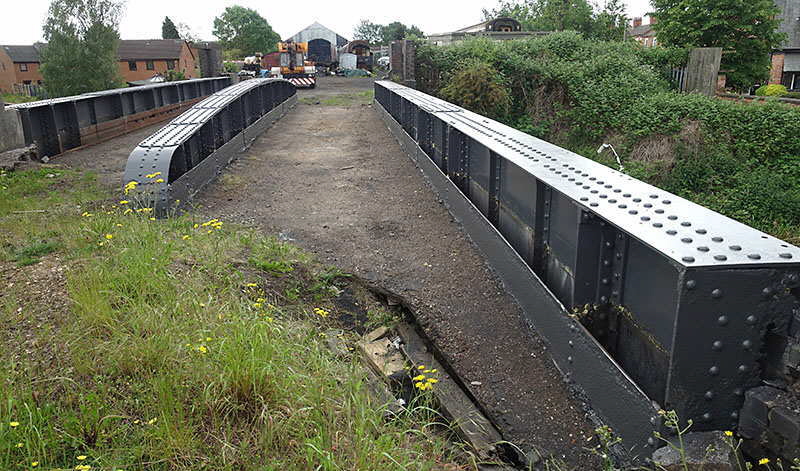
May 2019: Refurbishment so far has involved grit-blasting, replacing the side top plates, and applying a protective coating
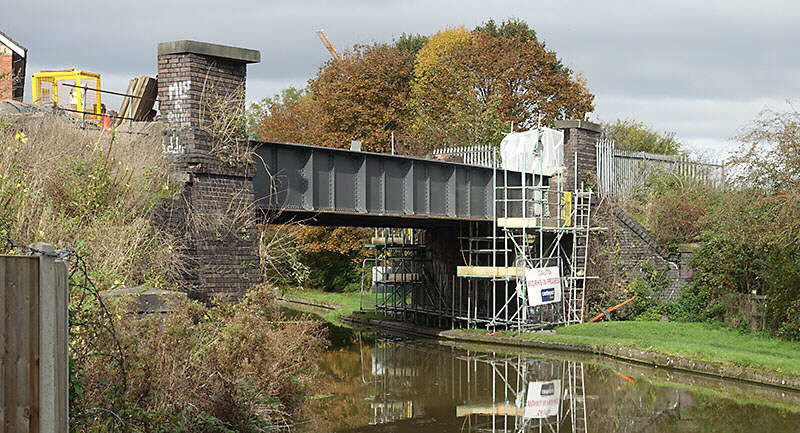
October 2019: The next phase of work on the canal bridge, competing the refurbishment of the main girders, has started. The canal towpath has been closed temporarily to accomplish this safely.
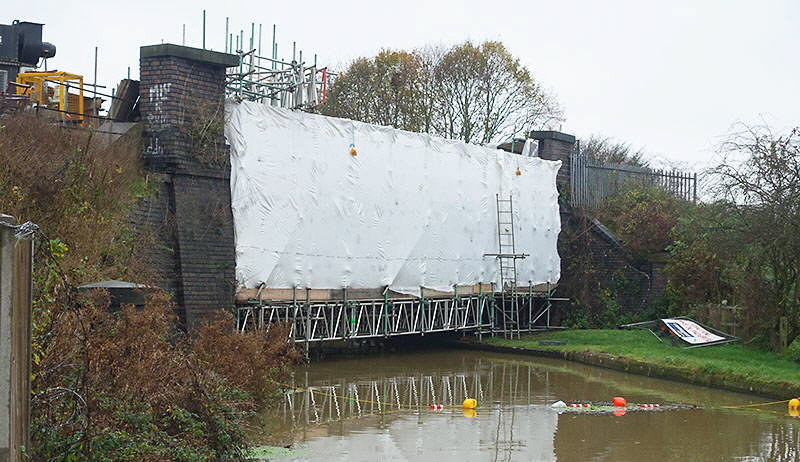
November 2019: The canal has been temporarily closed to allow the underneath of the bridge to be refurbished. The cocoon prevents the water from becoming polluted during the work.
December 2019: The cocoon round the canal bridge has been removed after the underneath has been refurbished, as seen here.
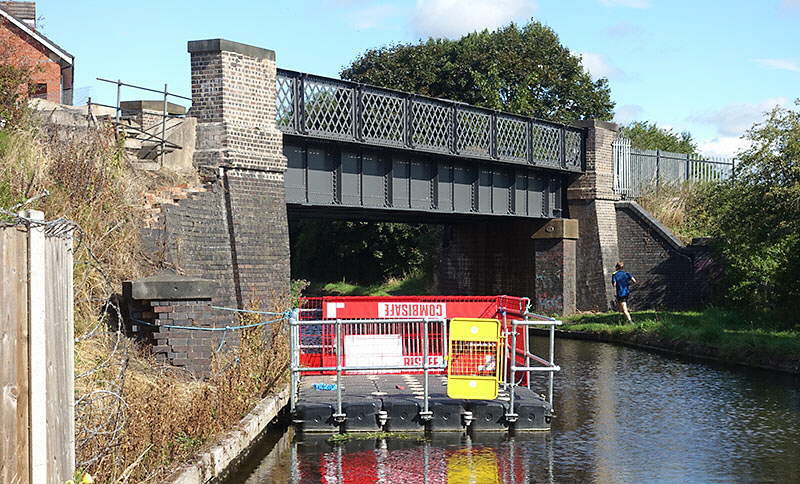
July 2020: The canal bridge is looking as good as new after the refurbished balustrades have been refitted.
Click here for details and photographs on the GCR website.
To get the railway across Railway Terrace and the Preci-Spark car park it is proposed to use a new bridge and arches.
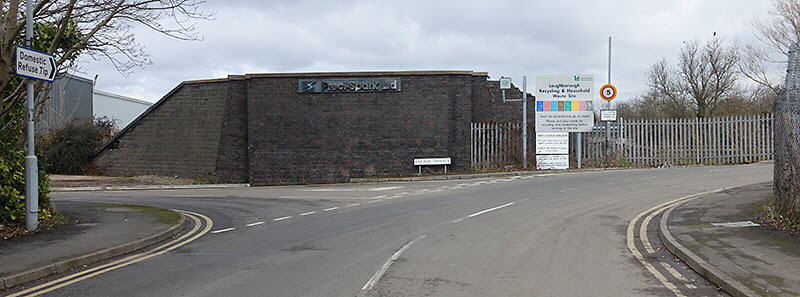
March 2018. The new bridge over the Midland Main Line is just beyond the old abutment of the GCR at Railway Terrace. Another bridge is required across the road here which leads to the Recycling & Houshold Waste Site.

March 2018. Panoramic photograph at Railway Terrace where the abutment in the photograph above can be seen in the centre and the new bridge over the Midland Main Line can be seen on the right. Bridges and short viaducts are required to span the road and the Preci-Spark car park, as shown in the model below.

Section of the model of ‘Bridging the Gap’ displayed at the GCR showing the proposed bridges and viaducts at Railway Terrace, corresponding to the panorama above.
4) Rebuilding several hundred metres of railway embankment
British Rail removed the railway embankment from north of the canal bridge to Railway Terrace in the 1980s and used the material to build the chord from the GCR(N) to the Midland Main Line before the bridge over the main line was removed (see the Old Photographs Section).
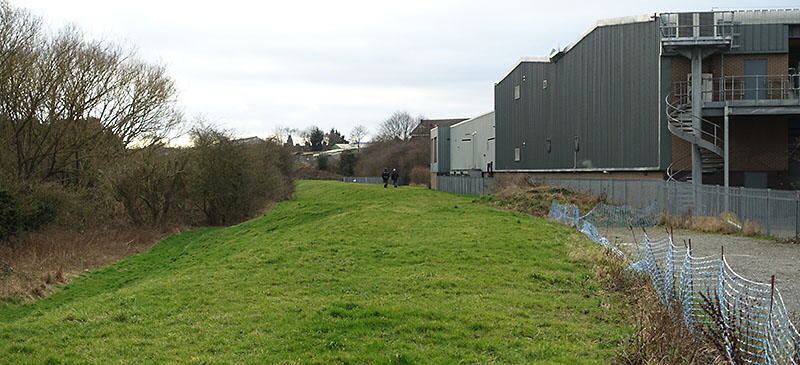
March 2018. The site of the missing embankment looking south from Railway Terrace. One of the Preci-Spark buildings is on the right and the apex of the roof of the GCR locomotive shed can just be made out to the left of centre.
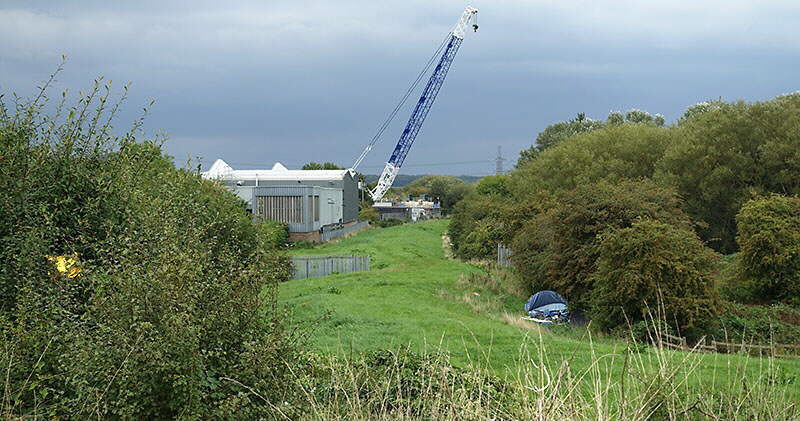
September 2017. The site of the missing embankment looking north from the bridge over the canal. The crane in the distance was ready to lift the new bridge over the Midland Main Line into position.
5) Relaying track and installing signalling
When all of the work of rebuilding bridges and the embankment is completed there will still be a large amount of work required in laying track and signalling.
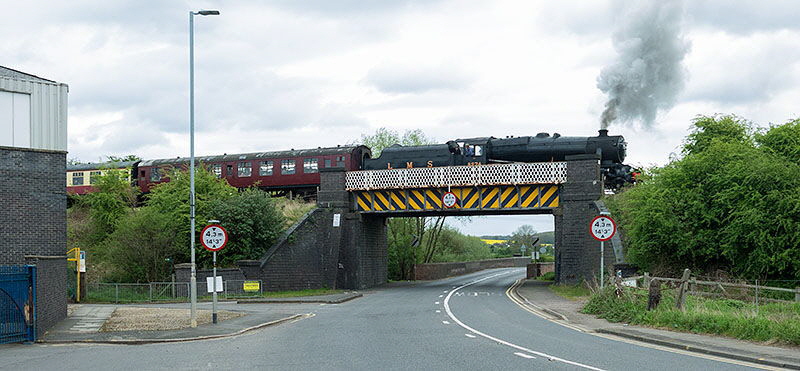
Here, in April 2017, 8F No. 8274 pauses at the furthest south that trains from the GCR(N) at Ruddington can reach on the north side of ‘The Gap’ during scheduled operation. This is the bridge over Nottingham Road, with the entrance to the Brush works on the left and ‘The Gap’ on the right. The locomotive has stopped just short of the top of the chord down to the Midland Main Line and the Network Rail track circuit, and will soon propel the train back to Ruddington.
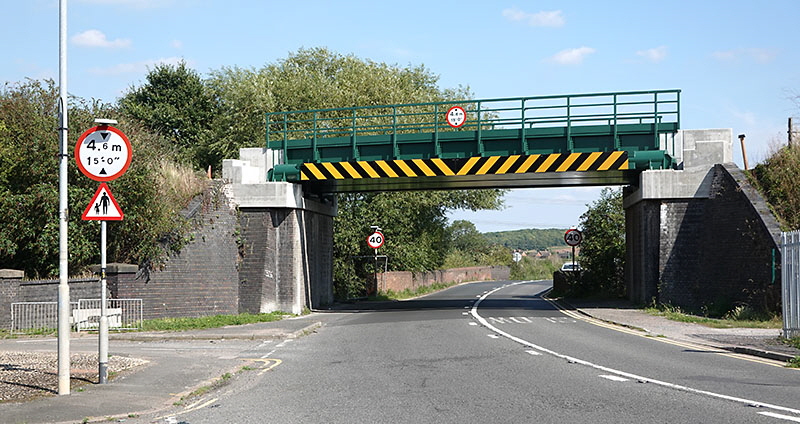
Gypsum trains to Hotchley Hill were halted in 2020 when excessive corrosion was discovered in the bridge over Nottingham Road, seen in the previous photograph. Since it was impractical to repair the bridge, at the end of September 2023 the old bridge was removed and in November a newly fabricated bridge was installed, though the track was not immediately reconnected. The modern design of the bridge allowed several inches extra clearance above the road, though chevron-painted sacrificial beams were installed to give more protection to the structure in case it was struck by a high vehicle.
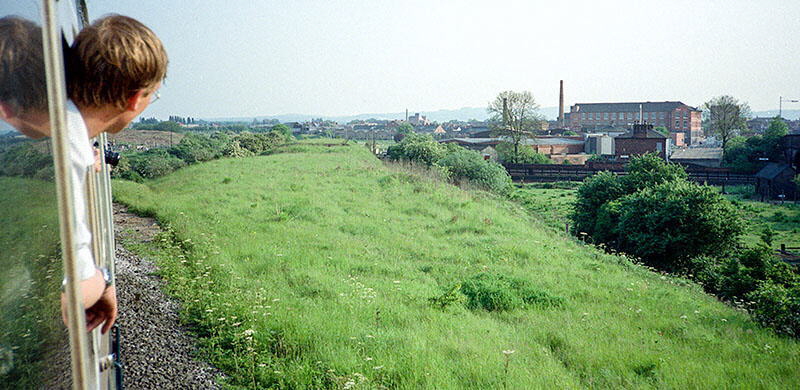
Looking south along the track bed of the Great Central Railway at the northern end of ‘The Gap’, just north of its crossing of the Midland Main Line.
Photograph taken from the ‘Ruddington Requiem’ rail tour in June 1984 as it returned from Ruddington and started to traverse the chord from the top of the embankment down to the Midland Main Line .
Track will be
required along here together with a new junction with the chord and appropriate signalling linked to the Network Rail system.

May 2019. Looking south across the partially refurbished canal bridge towards the station and the back of Loughborough locomotive shed, with its pointed end wall visible in the centre. The locomotive shed occupies the original trackbed and it is proposed that a through track is laid round the right-hand side (west side) and on to this bridge.
March 2018. Looking north from Empress Road bridge showing the locomotive shed, a former aircraft hanger brought here in bits and assembled in the mid-1970s. The plan is for the track to the north to run along the left-hand side (west side) past the shed.
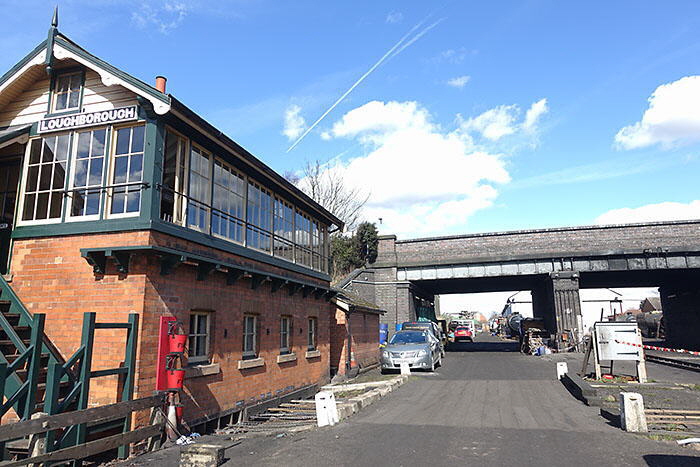
2025. It is proposed that the new track across ‘The Gap’ will have to run ahead through the left opening of Empress Road bridge and pass around the left
side of the recently refurbished locomotive shed, seen in the middle distance.
The signalling system of the GCR will have to be linked to GCR(N), across the gap, which is already connected to the Network Rail system to allow
Gypsum trains from the Midland Main Line to reach the Hotchley Hill Gypsum works via the 1980s chord.
For more information about ‘Bridging the Gap’ visit the Great Central Railway site at https://www.gcrailway.co.uk/about/reunification/.
[Leicester North]
[Abbey Lane Area]
[North Viaduct]
[Leicester Central]
[Braunstone Gate]
[Goods Yard]
[Aylestone]
[Bridging the Gap]
[Notes for Visitors]
[Old Photographs]
[Archive]
[Links]
© 2001-2026 Text and photographs copyright Nigel Tout, unless otherwise indicated.
